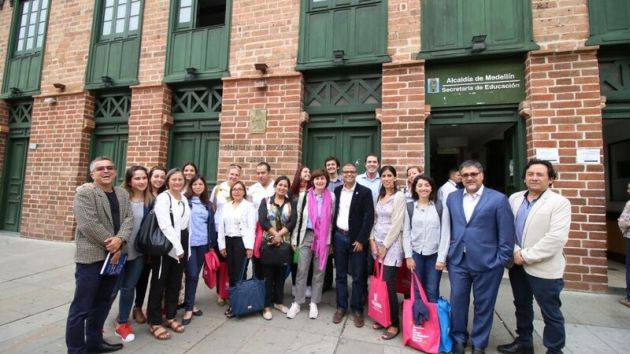Event report on: “Cooperation models for STEM education in the Pacific Alliance”
How can we work with each other and learn from each other across borders? Which STEM education projects will we work on together? How can a cooperative commitment to education effectively be put into practice? These questions were among those discussed on the subject of “Cooperation models for STEM education in the Pacific Alliance” from April 4-7 in Medellín, Colombia. Around 40 education experts from Experimento partner organizations in Chile, Colombia, Mexico and Peru took part. The participants were invited by Siemens Stiftung, which put on the networking event together with Fundación Siemens Colombia. The Medellín Ministry of Education provided organizational support. In her welcome speech, Dr. Barbara Filtzinger, head of working area education at Siemens Stiftung, thanked the participants for their attendance and their important contributions. “When it comes to providing young people with a sound STEM education in preparation for the challenges facing us now and in the future, no one can do it alone. Whether in Chile, Colombia, Mexico, Peru, or Germany: Networks and forums support the process of consequently and systematically strengthening STEM education in practice and in policy!”
The four-day meeting of the Pacific Alliance built upon this sentiment and focused on sharing expertise, coordinating on actionable steps, and gaining a sense of what strong collaboration within the alliance can achieve. As host city, Medellín was a prime example. The capital of Colombia’s Antioquia region represents best practice when it comes to regional alliances on economics, science, society, and policy all working toward sustainably strengthening STEM education. The city dedicates 40 percent of its budget to education investment, which includes improving science and technology skills and future opportunities for young people. Dr. Rafael Aubad, president of Ejecutivo Fundación Proantioquia, addressed the importance of education development for Medellín and the surrounding area in his welcoming address. Jorge Iván Ríos, secretary general of the Medellín Ministry of Education, added remarks on the strategy and central lines of action for the city’s public education policy. Medellín’s transformation to a “STEM city” was a key topic of the event’s first large workshop. Groundbreaking presentations on strategy, lively discussions on how innovative stakeholder engagement can develop STEM education, and visits to the education institutions Sol de Oriente and Parque Explora all contributed to the workshop’s in-depth and practice-oriented exchange.
Freshly inspired by the possibilities of collective engagement, the participants from the Experimento partner organizations addressed the needs and opportunities of impact-oriented and trans-regional collaboration in a second workshop. Professor Kristina Reiss, deacon of the TUM School of Education in Munich, presented the results of the most recent PISA study, which contained a mixed bag of conclusions. On the plus side, the study showed slight to strong improvements with proof of positive trends. On the down side, all Latin American countries in the study still landed below the average, and the social-cultural background of pupils is still a decisive factor in their scholastic development.
The Experimento Forum, which is currently in development, will provide good opportunities for efficient and fruitful network collaboration. It will operate as an integrated part of the OLADIC (Oberservatorio Latinoamericano de Didáctica de las Ciencias) online platform. The Experimento Forum was initiated by the Catholic University Valparaíso PUCV (Chile). It is a regional Siemens Stiftung network that offers, along with OLADIC, a platform for multidisciplinary discourse on research, doctrine, and practice in math and science. With its own online forum for Experimento partners, the cross-border and cross-institutional initiative is meant to bring all stakeholders closer together for the mutual exchange of expertise, strategies, ideas, and experiences.
This represents an excellent opportunity to continue together along the path toward strengthening STEM education in policy and in practical application, and to bundle impact-oriented interests in trans-regional initiatives such as “Pacific Adventure STEAM.”



